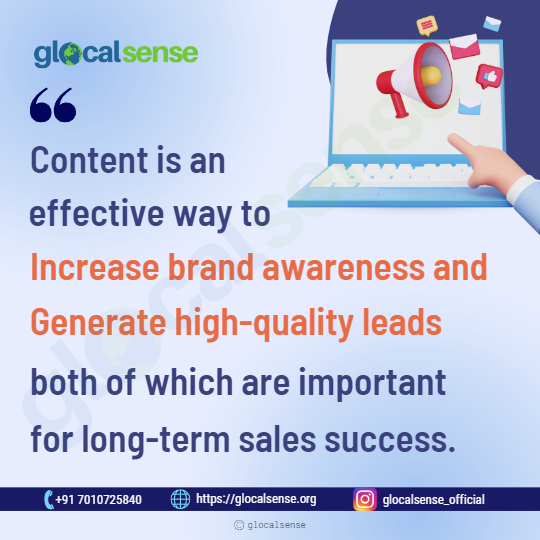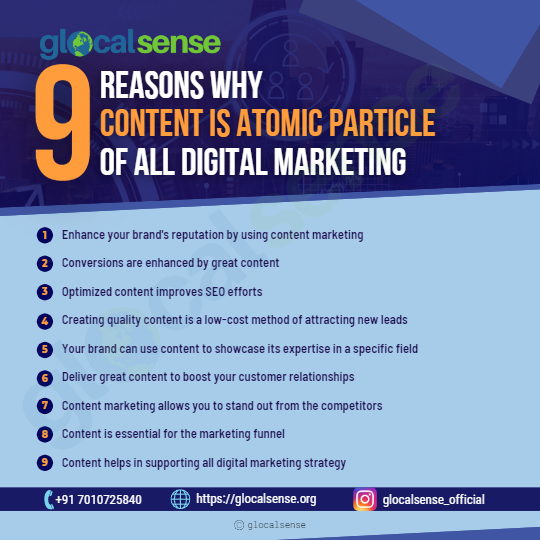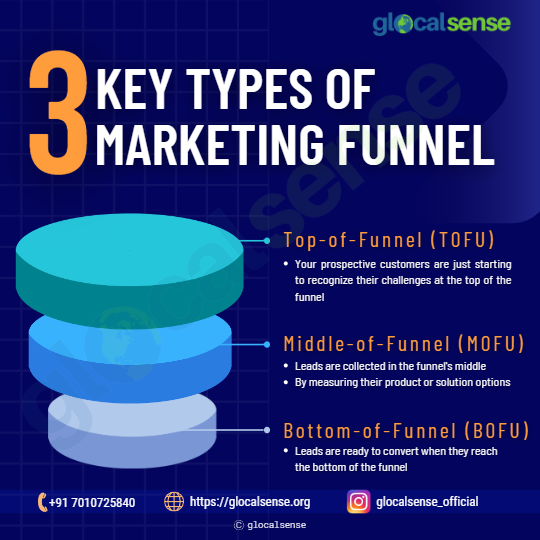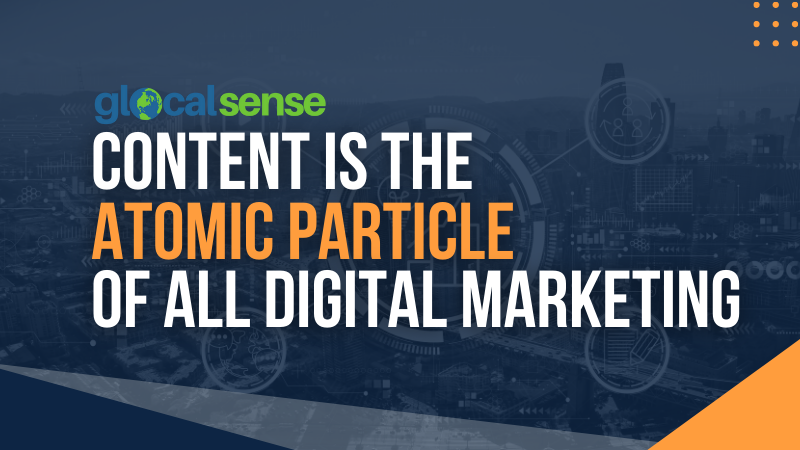Digital marketing is all about using the internet to connect with your target audience. Content marketing has proven to be one of the most effective ways for marketers to connect. Content should be an integral part of your overall digital marketing strategy. Content at its best requires planning and thought. So, what exactly is content marketing in the context of digital marketing? Let’s take a deeper look at it and see where it fits into the bigger picture of digital.
In digital marketing, the value of content marketing cannot be overstated. It comes from its ability to boost high-quality traffic to your website. Content prevails in raising awareness and producing high-quality leads, which are important for sustainable sales growth. Content is an effective way to increase brand awareness and generate high-quality leads, both of which are important for long-term sales success. A well-planned content has the quality to attract your targeted audience to your company’s website, where they will eventually become leads and revenues.

Content creation for your blog, SEO, and social media marketing activities are the most effective ways to drive traffic to your website. While there are many crucial criteria in these categories, it ultimately boils down to quality.
The more informative and attractive your content is to your readers, the better they engage with your business. In addition, the content will enable visitors to likely develop trust in your brand and become a prospect and clients if they engage with your company and spend time on your website. As a result, you’ll get a significant return on your content marketing investment.
About Content Marketing
Content marketing is another way to provide information to customers and audiences; it has various applications in the digital marketing industry. In simple terms, content marketing is creating and distributing collateral and other informational materials through various online networks. Beyond everything, content marketing should make people take action.
First and foremost, it must be interesting and highly relevant to the viewer to whom it is being served. You want people to use it, interact with it, and engage with it.
Second, content can be used by businesses to increase brand awareness. Professionals of the domain can establish themselves as an industry thought leaders by sharing their work insights. However, you may be trying to appear on page one of search engine results when your target consumers are looking for assistance. Content marketing pushes you forward through trial and error.
Third, if the content you create is entertaining – at least on some level that helps more.
Types of Content Marketing
Seeing instances of content marketing is the most effective approach to understanding it. The real beauty of content marketing, on the other hand, is that it has no boundaries. Content marketing is when you can develop something in some form of media and then get it in front of your target audience. The content on your website gives you the chance to share knowledge-relevant stories or highlight your team or co-workers. In addition, they provide SEO value to your site and might help you attract new customers to your business.
A video is the logical next step after just a blog. Of course, you can still share that valuable information with your customers. Still, you’re putting yourself (or someone you trust as a brand ambassador) in front of them. People who prefer to watch instead of readers will appreciate the addition of personality and voice while still receiving easily accessible information.
Customers enjoy knowing that others appreciate your product or service as much as they do. As a result, case studies are a popular type of content that is simple to create. They analyze a customer’s problem and explain how you could resolve it. Infographics add a visual element to information that is otherwise easily consumable. Infographics are an engaging method to fix up information that people might otherwise glaze over. It is often based on numbers or facts.
The list goes on and on: whitepapers, eBooks, emails, how-to guides, podcasts, and so on. The most important thing is meeting your audience and creating content tailored to their interests. Of course, you can look at other channels and see if they can help you but don’t expect someone who spends half their day on YouTube to read a long-winded eBook.
How to work with Content Marketing
Content marketing is simple to implement. It has no difference whether you are a marketer by trade or not. You can generate content. Granted, you won’t be able to create it without a strategy, but there are basic steps you can take to get there.
For example, to know your audience, know whether the audience spends time watching how-to videos on YouTube or reading long instruction manuals? Then, make content for the sites they’ve already been to. Create a list of topics you can discuss next. Start with questions that customers or clients regularly ask. Then, focus on important or interesting aspects of your business that only an expert would know how to do.
Finally, ask what you desire. Do you want the audience to share your blog post with friends? Do you want to get a free consultation by filling out a form? Why not visit your shop? At the end of your post, include a clear call to action that asks for what you want. Never foresee someone accomplishing it all by themselves. You’re much more likely to obtain something when you ask for something.
9 Reasons Why Content is Atomic Particle of all Digital Marketing

Content marketing improves your company’s online reputation. Blog posts, videos, infographics, presentations, and social media posts are among the types of content delivered to viewers. We not only entice the consumer, but we also begin to create brand trust by providing value in this way. There is an experience of discovering valuable content and a sense of delight in making the discovery.
Let’s look at nine specific benefits of content marketing in even more detail.
1. Enhance your brand’s reputation by using content marketing
The reputation-building capabilities of great content are one of the best benefits that highlight the relevance of content marketing. In today’s dynamic digital marketplace, businesses must build trust with their leads and customers. Furthermore, developing trust can help your company develop a positive brand image.
Creating custom content is an excellent way to learn more about your leads and consumers while building goodwill. In addition, great content may aid in the development of trust among your leads and consumers. When consumers read your content, they form opinions about your company. Assume the content they discover is interesting, educational, and useful. In that case, they will begin to think similarly about your company.
The more value your content provides, the easier it will build your target audience. Furthermore, when your leads and customers see that you routinely generate content across platforms. The customers may begin to regard you as an industry leader. You may also help your target market gain trust by publishing content in third-party media or sharing your content with influencers.
2. Conversions are enhanced by great content
Look no further than the conversion numbers to understand why content marketing is vital.
Here are some statistics that show the significance of content marketing in increasing website conversions:
- Conversion rates for content marketing are approximately six times higher than other digital marketing methods. (Source: ABG Essentials)
- After reading recommendations on a blog from Content Marketing Institute (CMI), 61% of online shoppers in the United States purchased.
- According to Curata, content marketing has enhanced the quantity and quality of marketing leads for 74% of organizations surveyed.
- Video content can deliver an incredible ROI and considerably enhance conversions, according to 72% of firms surveyed by CrazyEgg.
- According to a HubSpot survey, inbound marketers have been able to double the typical site conversion rate (from 6 to 12 %) due to their content marketing efforts.
Conversions are aided by content marketing because it allows you to engage and educate your leads and customers. You are not only attempting to build trust and relationships, but you are also attempting to encourage conversions. By connecting consumers with the information, they require to make an educated purchase decision. Therefore, make sure to include a clear call-to-action in your content to increase conversions.
Your CTA directs the reader on what to do next, guiding them to the conversion process next step. Whether your conversion goal is to make a purchase, obtain additional information, or contact your sales team. It is critical to make it clear to the reader what you want them to do within the text.
3. Optimized content improves SEO efforts
When we analyze how content marketing aids in developing and enhancing search engine optimization, the value of content marketing becomes evident (SEO). SEO is critical for increasing your company’s online visibility. However, if you want to improve your SEO, you must create optimized content.
According to Tech Client, the most effective SEO method is content creation. Business sites that consistently generate blog content have 434% more pages indexed by search engines than those not. The more pages your site does have, the more pages the search engine must index and display to users in their search results.
Though having more pages does not always indicate more significant traffic, your brand can rank for more keywords. For example, writing blogs on various relevant topics increases your chances of ranking for the keywords they’re looking for. Not to add, the more content you offer on your website, the more reasons visitors have to stay. This method translates to more time spent on-site, which can help your search engine optimization.
According to Google, time spent on the site is one indicator that your site has valuable content.
4. Creating quality content is a low-cost method of attracting new leads
Lead generation is especially important for small firms that rely on consistent traffic to expand their brand and revenue. Not only is content marketing effective at generating leads, but it is also inexpensive. According to DemandMetric, content marketing costs 62% less than traditional marketing tactics but generates three times the number of leads. Therefore, content marketing is essential for small firms to maximize their budget due to its low cost.
When it comes to developing high-quality content, though, a little goes a long way. According to Social Media Examiner, more than 81% of marketers found that investing as little as 6 hours per week on social media content increased traffic. When you consider the return on investment, it’s clear why content marketing is so important. Because developing content is both affordable and effective, many small businesses will see a significant return on their investment in content marketing over time.
Content marketing generates three times the number of leads as paid search advertisements per dollar spent. Creating a digital content strategy that considers your target market is essential for improving content ROI.
Your content should be strategic:
- in the topics you choose,
- the types of assets you produce, and
- your promotional methods
5. Your brand can use content to showcase its expertise in a specific field
Customers want to know they’re dealing with industry experts who know everything about the business. Your brand can demonstrate its competence in the sector through content marketing. While also giving useful information that can assist readers in making better-informed purchasing decisions.
Make sure to include the following information in every publication:
- A new blog post,
- White paper or,
- A new blog post
You’re showing leads and consumers how knowledgeable you are about the industry and the challenges they face. When it’s time to buy, customers will remember the brand that provided them with their required information.
Let’s imagine the choice is between purchasing from a business that releases educational and informative information regularly or from one that doesn’t. A customer is more likely to purchase from a company that has proven its competence and knowledge. They will have peace of mind as a result of this. Because they know they’ll be looked after by industry specialists who can answer their queries and quickly resolve any problems.
6. Deliver great content to boost your customer relationships
If you’re still uncertain, here’s why content marketing is so vital. But, first, consider how effective content marketing can aid in developing customer relationships. We have already discussed how content is essential for developing trust and a positive brand reputation. The new content can assist you in expanding your audience and generating new leads.
But what about the customers who have already purchased from you? Many businesses rely on repeat customers to stay solvent. According to BIA Kelsey, 61% of SMBs claim that repeat customers account for half of their revenue. Furthermore, according to Marketing Tech Blog, a loyal customer is worth up to 10 times as much as their first purchase. Loyal clients are beneficial to your business.
Suppose repeat sales contribute to a large amount of your business. In that case, you’ll need to figure out how to improve your current consumer relationships. It’s here that content marketing comes into play. After a lead becomes a customer, providing great content doesn’t end. Content can help you develop powerful brand advocates and boost repeat sales.
So, what kind of content is most significant for fostering brand loyalty?
- How-to videos and other sorts of instructional visual content can assist your customers in getting more value from your products or services.
- Brand guidelines and comparisons are two other examples of content that can assist your customers in getting extra value.
- You aim to develop more trust and drive repeat sales by assisting customers in making better purchasing decisions.
7. Content marketing allows you to stand out from the competitors
In today’s competitive digital marketplace, your small business must stand out from the rest. That’s why content marketing is essential. Content marketing is an efficient technique for small businesses to differentiate themselves from the competition. Also, to show what makes their company unique! The topics and importance of the content you publish can influence a customer’s decision to choose your brand over a competitor’s.
For example, suppose a buyer explores their challenges and the products that can help solve them. They will be more likely to collaborate with a company that has given them useful information. If this isn’t enough to convince the reader of the importance of content marketing, consider the role it plays in assisting you in developing a brand identity and voice. You may differentiate yourself from the competition in more ways than just the type of content you produce. That is done through the language you use in your content and how you show your information.
8. Content is essential for the marketing funnel

Let’s discuss the importance of content marketing in your marketing funnel.
While developing your digital marketing efforts, you should think about three key types of your marketing funnel. First, content marketing is important at every stage of the funnel. Second, throughout the marketing funnel, content marketing plays a role:
1) Top-of-Funnel (TOFU):
- Your prospective customers are just starting to recognize their challenges at the top of the funnel. They are also starting to appreciate that there are alternatives.
- Customers may benefit from content at this stage by educating them and providing them with the information required to decide which type of solution to use will be most beneficial.
2) Middle-of-Funnel (MOFU):
- Leads are collected in the funnel’s middle. By measuring their product or solution options.
- At this stage of the funnel, the goal of content is to notify leads about their various options. This mechanism will allow them to begin restricting their options and get closer to making a final purchase decision.
3) Bottom-of-Funnel (BOFU):
- Leads are ready to convert when they reach the bottom of the funnel.
- The content of this stage is intended to provide the buyer with one more nudge of encouragement and empower them to make an informed purchasing decision.
While developing a content marketing strategy to reach potential customers at each stage, remember what each lead requires at this point in their buyer’s journey. The top-of-the-funnel prospects require more general information to understand their issues and challenge better. Leads that have moved to the funnel center require more specific information to help them evaluate their options.
On the other hand, leads at the bottom of the funnel require content that contains specific facts about your unique offer to make an informed purchasing decision.
9. Content helps in supporting all digital marketing strategy
One more benefit of content marketing is that it helps to keep the rest of your digital marketing strategy on track by providing consistent, high-quality content. Most small firms have more than one tool in their digital marketing toolbox. You may employ numerous strategies to attract and engage your desired audience, from email marketing to social media to PPC ads.
Are you curious as to what these techniques have in common?
Excellent content! Any approach you use in your digital marketing campaigns should include creating compelling, high-quality content. You must create interesting email content that entices readers to take the next step.
For instance, a blog can provide consumers with the information to advance through the funnel. There must be no doubt about it because content marketing is integrated into all other aspects of your digital marketing strategy.
Conclusion
With all of the benefits of content marketing, it’s easy to see why it’s so important for businesses of all sizes. Content marketing may help you increase visibility and strengthen relationships with your leads and customers. It’s time to get started if you truly want to witness the value of content marketing in action. Work on creating a content marketing plan that focuses on your ideal customers. Then you’ll be quite well on your way to producing quality content that will help you increase conversions and customer retention.
